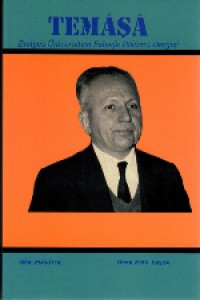Abstract
Çağdaş zihin felsefesinde Kartezyen Düalizm genellikle Descartes’in zihnin maddi bir şey olmadığı tezine işaret eden bir terim olarak kabul edilmiştir. Kartezyen ontoloji yalnızca iki tür töze izin verdiğinden, insan da sonuçta tamamen iki bağımsız, yabancı tözün birleşiminden oluşan bir varlıktır. Onun bir parçası olan beden, mekanik dünyanın bir parçası olarak, bütünüyle maddi ve yayılımlı olan (res extensa) bir tözdür. Bu yüzden, insan bedeninin işleyişi yalnızca fiziksel ve mekanik terimlerle, yani hareket halindeki maddenin yasaları ile açıklanabilir. Oysa zihin bütünüyle maddi olmayan ve bu yüzden de uzamsız düşünen (res cogitans) bir tözdür. Böyle düalist zihin felsefesine ilişkin en belirgin sorun, onun, yani zihnin maddi olmayan bir şey olmasından kaynaklanır. Zihnin maddi bir şey olmadığı fikri ise kaçınılmaz olarak zihin ile beden arasındaki ‘birlik’ ve ‘etkileşim’ problemini de beraberinde getirmiştir. Bu makalenin amacı, düalist tezlerin aksine, zihin ile bedenin zorunlu ‘birliği’ve özelikle psikofiziksel etkileşimlerin doğasına ilişkin Kartezyen iddiaları eleştirel bir yaklaşımla ele alınıp değerlendirmektir
References
- CHAVEZ-ARVIZO, Enrique, “Descartes's Interactionism and His Principle of Causality”. The European Legacy 2 (6),(1997): 959-976.
- CHURCHLAND, Paul, Matter and Consciousness, second edition Cambridge, Massachusetts: MIT Press, 1988.
- COTTINGHAM, John, A Descartes Dictionary Oxford: Blackwell, 1993.
- COTTINGHAM, John, Descartes Oxford: Basil Blackwell, 1985
- COTTINGHAM, John, ed. and trans., Descartes' Conversation with Burman Oxford: Oxford University [Clarendon] Press, 1976
- COTTINGHAM, John, Robert Stoothoff, and Dugald Murdoch, eds. and trans. The Philosophical Writings of Descartes 2 vols. Cambridge: Cambridge University Press, 1985. [Volume 3 of the preceding, by the same translators and Anthony Kenny. Cambridge: Cambridge University Press, 1991.]
- COTTINGHAM, John, The Cambridge Companion to Descartes Cambridge: Cambridge University Press, 1992.
- COTTINGHAM, John, The Rationalists Oxford: Oxford University Press, 1988.
- EDWARDS, Paul (ed.), The Encyclopaedia of Philosophy New York: Macmillan, 1967.
- KENNY, Anthony, ed. and trans., Descartes: Philosophical Letters Oxford: Oxford University Press, 1970; repr. Oxford: Basil Blackwell, 1980.
- MALEBRANCHE, Nicolas, The Search after Truth De la recherche de la verite, 1674-5, trans. T. M. Lennon and P. J. Olscamp Columbus: Ohio State University Press, 1980
- POPKIN, Richard, Philosophy Made Simple, London: W. H. Allen, 1975. RYLE, Gilbert, The Concept of Mind London: Hutchinson, 1949.
- WILLIAMS, Bernard, Descartes: The Project of Pure Inquiry London: Penguin, 1978.
Abstract
In the contemporary philosophy of mind, the term Cartesian dualism is generally accepted to refer to Descartes’ doctrine of the incorporeality of the mind. Due to the dualistic ontology, a human being is a union of two independent alien substances, namely mind and body. The body, as a part of the mechanical universe, is an entirely physical and thereby extended substance (res extensa). For this reason, the workings of the human body can be explained in merely physical and mechanical terms, that is, the laws of matter in motion. However, the mind is entirely a noncorporeal and therefore unextended thinking substance (res cogitans). The most apparent problem with such dualistic philosophy of mind arises from its immateriality. The idea of the “immateriality” of the mind inevitably brought about the problem of ‘unity’ between mind and body and that of the ‘interaction’ between them. The purpose of this article, as distinct from the dualistic thesis, is to provide a critical evaluation of the Cartesian doctrine of the essential ‘union’ of the mind and body and especially the nature of psychophysical interaction.
References
- CHAVEZ-ARVIZO, Enrique, “Descartes's Interactionism and His Principle of Causality”. The European Legacy 2 (6),(1997): 959-976.
- CHURCHLAND, Paul, Matter and Consciousness, second edition Cambridge, Massachusetts: MIT Press, 1988.
- COTTINGHAM, John, A Descartes Dictionary Oxford: Blackwell, 1993.
- COTTINGHAM, John, Descartes Oxford: Basil Blackwell, 1985
- COTTINGHAM, John, ed. and trans., Descartes' Conversation with Burman Oxford: Oxford University [Clarendon] Press, 1976
- COTTINGHAM, John, Robert Stoothoff, and Dugald Murdoch, eds. and trans. The Philosophical Writings of Descartes 2 vols. Cambridge: Cambridge University Press, 1985. [Volume 3 of the preceding, by the same translators and Anthony Kenny. Cambridge: Cambridge University Press, 1991.]
- COTTINGHAM, John, The Cambridge Companion to Descartes Cambridge: Cambridge University Press, 1992.
- COTTINGHAM, John, The Rationalists Oxford: Oxford University Press, 1988.
- EDWARDS, Paul (ed.), The Encyclopaedia of Philosophy New York: Macmillan, 1967.
- KENNY, Anthony, ed. and trans., Descartes: Philosophical Letters Oxford: Oxford University Press, 1970; repr. Oxford: Basil Blackwell, 1980.
- MALEBRANCHE, Nicolas, The Search after Truth De la recherche de la verite, 1674-5, trans. T. M. Lennon and P. J. Olscamp Columbus: Ohio State University Press, 1980
- POPKIN, Richard, Philosophy Made Simple, London: W. H. Allen, 1975. RYLE, Gilbert, The Concept of Mind London: Hutchinson, 1949.
- WILLIAMS, Bernard, Descartes: The Project of Pure Inquiry London: Penguin, 1978.
Details
| Other ID | JA22AH54PZ |
|---|---|
| Journal Section | Articles |
| Authors | |
| Publication Date | January 1, 2016 |
| Submission Date | January 1, 2016 |
| Published in Issue | Year 2016 Issue: 4 |


